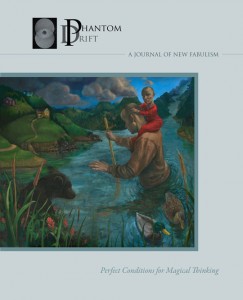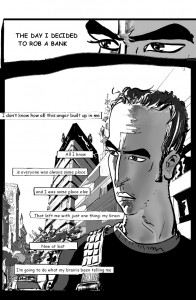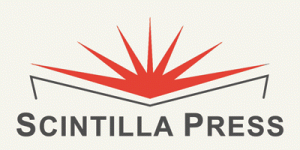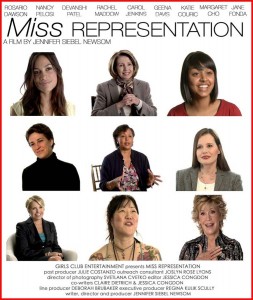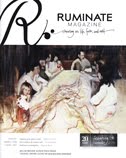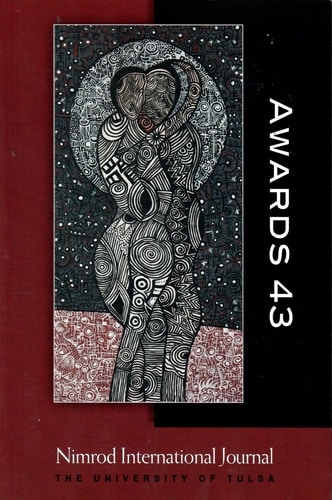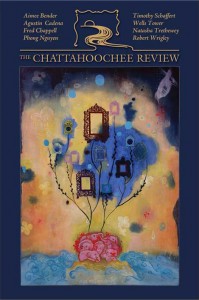 Theresa Williams is Senior Lecturer in English and Creative Writing at Bowling Green State University and founder and editor of The Letter Project, an online repository for actual letters written and sent. Williams encourages the love and appreciation of traditional mail in soliciting letters from writers of all walks of life. The guidelines: You must actually write a letter to a real person, and the subject matter must be “a writer or written work that is important to you. It may also deal with writing or engaging in any other art. Your letters may also include your own stories or poems or be written in the form of stories or poems.” Williams selects submissions to post online, often with images of the mailart sent or received.
Theresa Williams is Senior Lecturer in English and Creative Writing at Bowling Green State University and founder and editor of The Letter Project, an online repository for actual letters written and sent. Williams encourages the love and appreciation of traditional mail in soliciting letters from writers of all walks of life. The guidelines: You must actually write a letter to a real person, and the subject matter must be “a writer or written work that is important to you. It may also deal with writing or engaging in any other art. Your letters may also include your own stories or poems or be written in the form of stories or poems.” Williams selects submissions to post online, often with images of the mailart sent or received.
Intrigued by this project, the possibilities for individuals to become involved as well as for teachers to engage students, I posed a few questions to Theresa via e-mail, which she was so kind as to answer. (Sometimes e-mail is great, too!)
***
NP: It looks like you’ve been doing this for some time. Do you hope to continue it indefinitely? Is it a project you’re working on with an end in sight?
TW: The blog has been going since 2009. I started it because I love writing and receiving letters and because I wanted to introduce my university students to the experience of writing letters. The blog is a repository of letters and mailart, and it will continue to be. In the near future, I want to create a website called The Epistolarium. The Epistolarium will include interviews, letters, mailart, and epistolary poems and stories. The main criterion will be, as always, that the published piece must pass through the snail mail system.
NP: Has the site provided you with what you were expecting? In what ways has it surprised you?
TW: I expected that my university students would create some amazing letters, and they have. I expected that I’d love reading their letters, and I have. I expected that I’d write and receive more letters, and I certainly have.
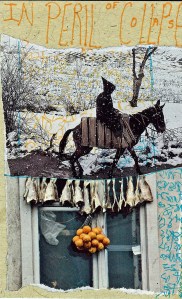 I didn’t expect to get involved in making art again because of the site. To give you some background: I have undergraduate degrees in both art and creative writing, but visual art had fallen by the wayside in my life for many years. I went on to get two Master’s Degrees in English and Creative Writing. My commitment to my writing was strong, and I spent many years developing my skills so I could produce work which could get published. The Letter Project got me interested in doing art again. It is the discovery of mailart that has been the biggest surprise.
I didn’t expect to get involved in making art again because of the site. To give you some background: I have undergraduate degrees in both art and creative writing, but visual art had fallen by the wayside in my life for many years. I went on to get two Master’s Degrees in English and Creative Writing. My commitment to my writing was strong, and I spent many years developing my skills so I could produce work which could get published. The Letter Project got me interested in doing art again. It is the discovery of mailart that has been the biggest surprise.
I didn’t know mailart existed until a few months ago when I found the International Union of Mail Artists online. I found it as a result of researching material for The Letter Project. IUOMA is 2000+ members strong, and has been going since the late 1980s. Anyone who loves to send and receive mail is free to join. I was surprised to find so many people who loved mail as much as I do! Much of the mailart I’ve received has come from people I met at IUOMA. So far I’ve exchanged mail and art with people from Belgium, Latvia, Russia, Germany, Iceland, Argentina, Brazil, and from many U.S. states.
NP: Can you name a couple specific ways in which you have found the effort beneficial for your students as well as for yourself as a teacher? (As teachers we know we learn from our own teaching!)
TW: When I got involved in mailart, it opened up a whole new way for me to create literary works. For instance, I began writing a series of prose poems based on the mailart that I was making and sending. So far, I’ve finished fifteen parts of a prose poem collection called “the eternal network.” Parts of “the eternal network” have appeared or will appear soon in qarrtsiluni, Rufous City Review, Ink Sweat & Tears, Thrush, and Infinity’s Kitchen. In most cases, the prose poems were accepted along with the original artwork. I’ve always loved making art, and I hoped someday I’d find a way to combine art and writing. Mailart has proven to be a way for me to do that. One form feeds another.
I’ve been encouraging students at my university (Bowling Green State University in Ohio) to try their hand at epistolary works, too. I’ve had students who have written letters that have positively changed their lives. One student, for instance, reconnected with her father through her letters about James Wright, and another student had remarkable discussions with her mother about the same author (her mother wrote letters back to her) and this student is thinking about creating a chapbook containing the letters of herself and her mother. Moreover, several students have told me about their parents crying (in a good way) upon receipt of their letters. Getting a letter in the mail is a powerful thing.
I’d like to see more being done with epistolary forms literary world. I have a fear of letter-writing and epistolary poems and stories disappearing, and that’s why The Letter Project is something I plan to keep doing.
I think for artists and writers, mailart and letter writing can serve many purposes. Here are just three:
1. Through mailart, an artist can exchange art with people from all over the world. You grow as an artist because you hold the artwork in your hands and evaluate the techniques being used. Most mail artists are very open about their materials and techniques.
2. Through letter writing, an author might clarify thoughts or discover the answer to a problem. The act of writing–any kind of writing–cures writer’s block. Look at the letters of Jack Kerouac and you’ll see an author working through his story ideas with his friends.
3. Writing and receiving mail helps break through the isolation that creative people often feel.
NP: Would you encourage teachers to use this as an assignment in their own classes with students who choose to do so sending you their work? If so, any advice on teaching this?
TW: Yes, I would. It’s a great way for students of all ages to avoid stilted writing. And it’s easy to teach because students are very receptive.
If teachers want to use this strategy in their classes, there’s one thing I’d beg them not to do. Don’t ask the students to write letters en masse to a living writer. Many writers resent receiving this kind of mail. They see it as an imposition. Instead, let the students write letters to people they know well about those authors.
I’d love to receive letters from people of all ages for use on the blog, especially letters on literary topics and creativity, but I wouldn’t want to receive letters en masse from an entire class. I’d prefer it if the teacher would sort through the letters, sending only the best ones. By “best” I mean those letters in which the writer was totally receptive and engaged.
NP: And anything else you’d like to add?
TW: The hardest thing about writing a letter or making a piece of art to send through the mail is getting started. We all claim that we don’t have enough time, but it doesn’t take much time to jot off a few lines or to glue together a collage. Letters contribute to our creative lives and help us to make enduring connections with others. Opening the mailbox and seeing real mail inside is the crowning glory of any day.
I’d also like to add that there are many great collections of letters out there for people to read. My favorite letters are those written by Van Gogh, Jack Kerouac, and James Wright. Their letters really explore the creative life in a deep way. If you are an artist or writer (even if just a would-be artist or writer), think now about creating and saving snail mail correspondences.
[Images of mailart created by Theresa Williams.]

